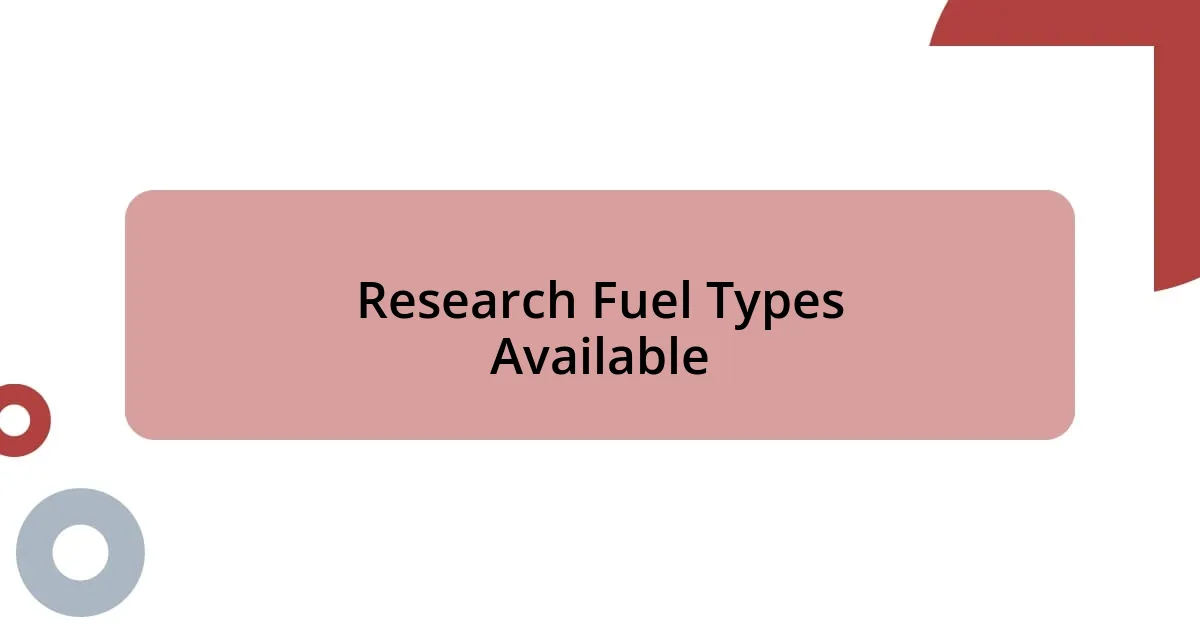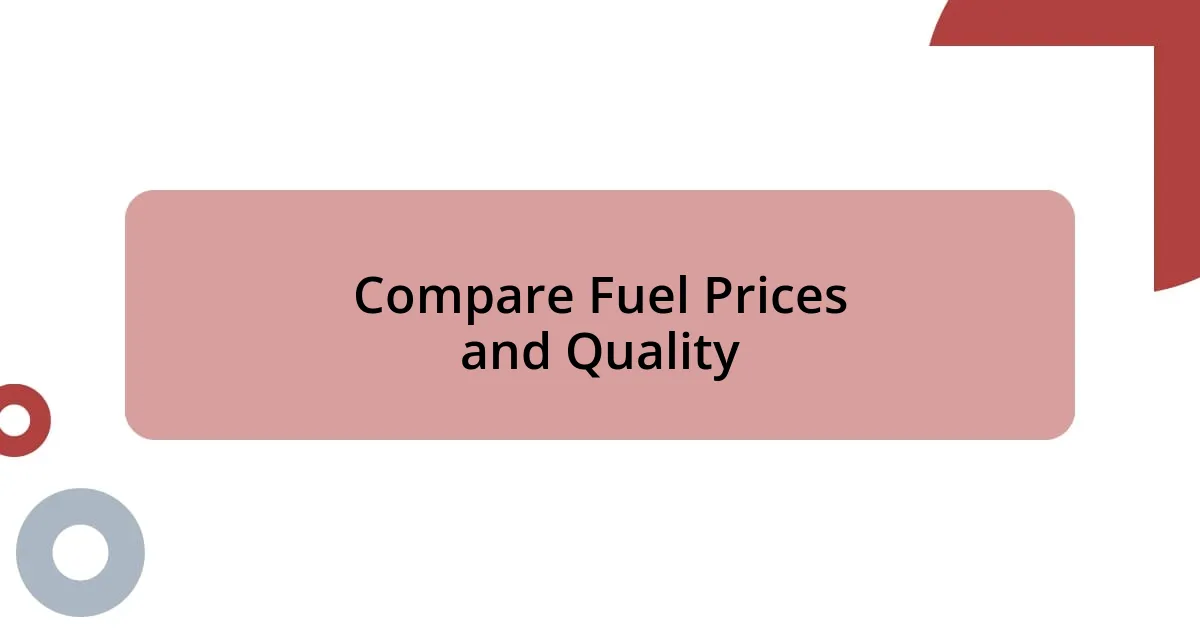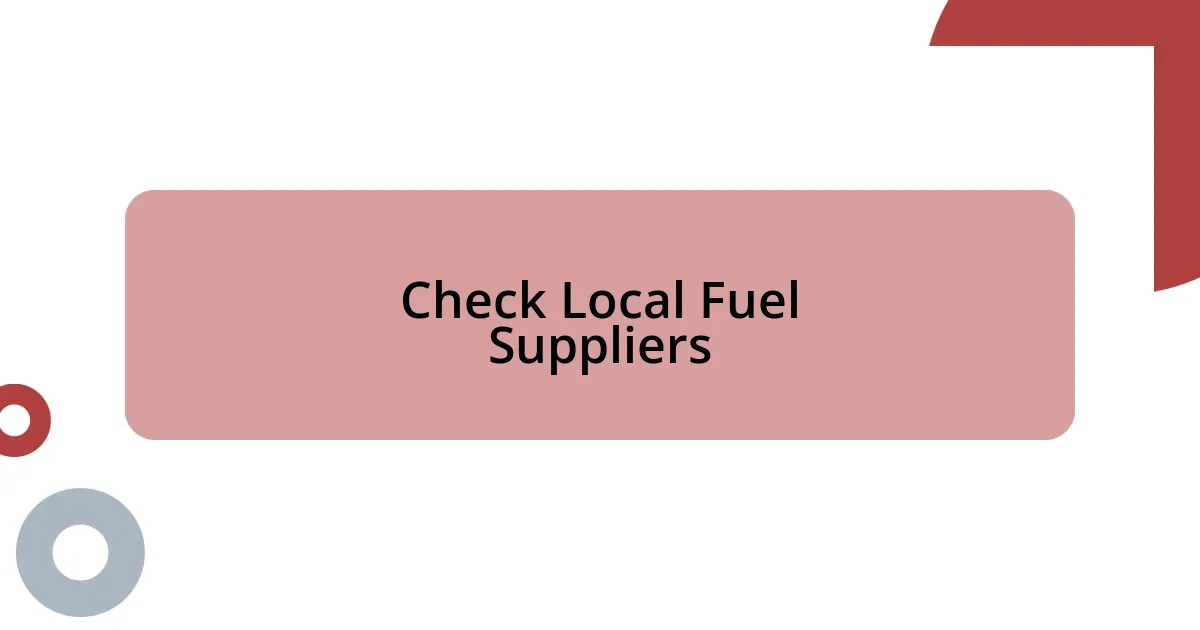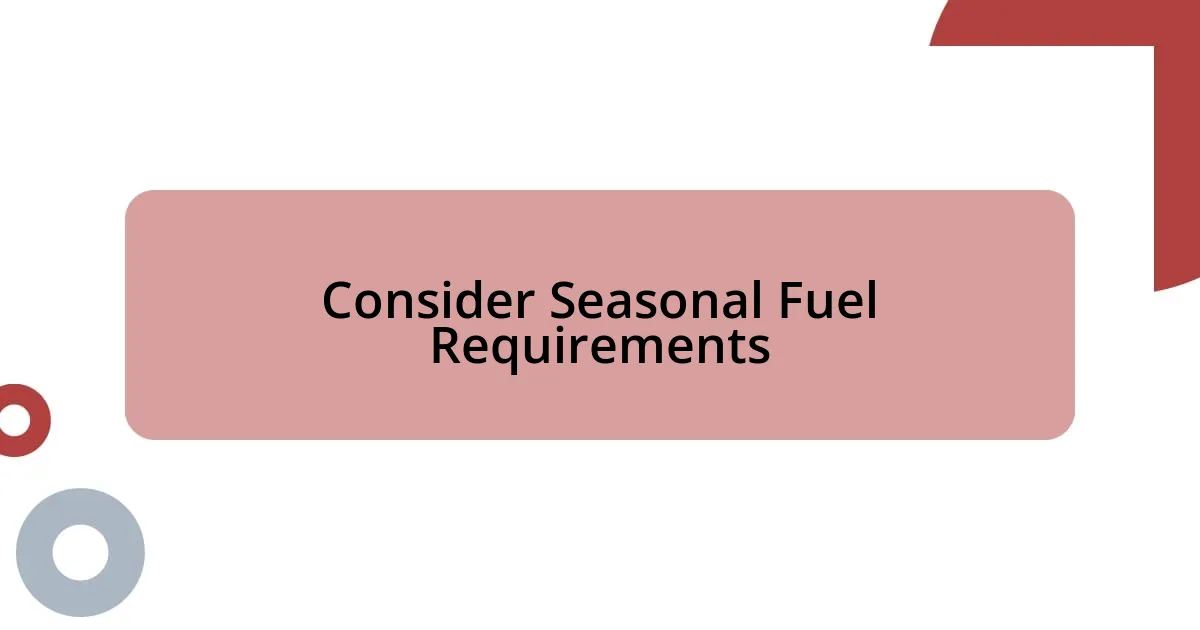Key takeaways:
- Assess your fuel needs based on vehicle use, driving habits, and manufacturer requirements to optimize fuel efficiency.
- Research different fuel types (gasoline, diesel, ethanol, biodiesel, electric, hybrid) to understand their benefits and impacts on performance and the environment.
- Compare fuel prices and quality, considering local market variability, brand reputation, and consumer reviews to make informed fueling decisions.
- Evaluate seasonal fuel requirements to choose the right fuel blends that enhance performance based on weather conditions.

Understand Your Fuel Needs
Understanding your fuel needs starts with assessing how you use your vehicle or equipment. I remember when I bought my first car—it was a used model that guzzled gas. I had no idea about fuel efficiency, and each visit to the pump drained my wallet. Have you ever felt that regret at the gas station? Recognizing your consumption patterns can help you avoid that pitfall.
Next, think about your driving habits. Do you often find yourself stuck in city traffic, or do you mostly take long highway trips? I’ve noticed that my fuel requirements fluctuate significantly depending on my travel routes. It’s like a light bulb moment when I realized that choosing the right fuel type could directly affect my mileage. Are you tapping into how different conditions impact your fuel consumption?
Finally, consider the manufacturer’s requirements for your vehicle or equipment. When I bought my bike, I was tempted to go for cheaper alternatives, but I learned the hard way that specific engines work best with certain fuels. That connection between optimal performance and fuel type is significant. What have you found works best for your needs?

Research Fuel Types Available
When it comes to choosing the right fuel type, it’s essential to dive into the options available in the market. For instance, I used to believe that gasoline was the only choice, until I stumbled upon diesel and even alternative fuels like ethanol and biodiesel. Each type has distinct advantages and drawbacks that cater to different vehicles and uses, providing an opportunity to maximize efficiency based on your needs.
I recall a time when I hesitated between regular and premium fuel. Initially, I thought premium would give me better performance, but through my research, I discovered it wasn’t necessarily compatible with my engine. Understanding the fuel types I was dealing with—octane ratings and their effects on my car’s performance—helped me make better choices at the pump. It’s fascinating how a little research can lead to big savings and enhance vehicle longevity.
Fuel types also include options like electric and hybrid, which are gaining traction. I remember test-driving an electric vehicle and feeling a rush of excitement realizing I could skip the gas station entirely. It’s incredible to think about how this transition not only changes the driving experience but also contributes to a more sustainable future. Have you thought about how different fuel types not only affect your wallet but also the environment?
| Fuel Type | Advantages |
|---|---|
| Gasoline | Widely available and suitable for most cars. |
| Diesel | Higher fuel efficiency and torque, ideal for heavy-duty vehicles. |
| Ethanol | Renewable and often lower in cost. |
| Biodiesel | Environmentally friendly and reduces emissions. |
| Electric | Zero emissions and lower operating costs. |
| Hybrid | Combines an internal combustion engine with an electric motor for better fuel efficiency. |

Compare Fuel Prices and Quality
I’ve found that comparing fuel prices and quality can be a bit of a puzzle. The last time I filled up, I was shocked to see how much prices can fluctuate from one station to another. I always like to use apps that show real-time fuel prices around me because it saves both time and money. But it’s not all about price—quality matters too. Some less reputable stations often sacrifice fuel quality for lower prices, leading to poorer vehicle performance.
Here are some factors to consider when comparing fuel prices and quality:
- Local Market Variability: Prices can change daily or even hourly based on supply and demand.
- Brand Reputation: Trustworthy brands are likely to provide better-quality fuel, which can lead to improved engine performance.
- Additives: Top-tier fuels often contain additives that can help clean your engine and improve efficiency.
- Fuel Grade: Sometimes, the cheapest option isn’t the best for your vehicle. Using a higher-grade fuel might save you from costly repairs down the line.
- Consumer Reviews: Check online reviews to gauge experiences others have had with fuel quality from different stations.
On a recent road trip, I noticed a significant dip in my car’s performance when I switched to a cheaper fuel option at a small station. I won’t forget the feeling of frustration as my normally smooth ride became sluggish, and my fuel efficiency plummeted. That experience taught me the importance of not just looking for the best price but also ensuring that I’m fueling with quality fuel that keeps my vehicle in top shape. There’s definitely a balance to strike—wouldn’t you agree?

Check Local Fuel Suppliers
I’ve learned that checking local fuel suppliers can save you a lot of headaches down the road. When I first moved to a new city, I didn’t realize how important it was to find trustworthy fuel sources. After a few trips to lesser-known stations, I discovered that not all suppliers are created equal. I experienced engine performance issues, which really drove home the message that quality fuel matters.
It’s also interesting to see how local suppliers can vary in their offerings. My favorite station not only has competitive prices, but they also carry high-quality fuels with beneficial additives. Have you ever stopped to consider how the fuel you choose can influence not just performance but also your vehicle’s longevity? Finding suppliers who prioritize quality over mere savings can lead to better long-term outcomes for your car.
One memorable incident stands out in my mind: I once visited a discount fuel station because it was only a few cents cheaper per gallon. I filled up without thinking twice, and the very next day, my engine started sputtering. It was a costly mistake that made me appreciate the value of doing my homework before filling up. Now, I always check reviews and ratings for local suppliers to ensure I’m making an informed choice. Wouldn’t you agree that a little extra effort can save you from future frustration?

Evaluate Environmental Impact
When considering the environmental impact of fuel options, it’s crucial to think beyond just price. I remember attending a workshop where we discussed the carbon footprint of various fuel types. The conversation really opened my eyes; I hadn’t realized how much traditional fuels contribute to air pollution and climate change. Are we willing to compromise our environment for a few extra bucks at the pump? For instance, I’ve started opting for fuels that are blended with renewable resources. This small change has made me feel like I’m doing my part for the planet.
Additionally, I find it fascinating to explore the production and refining process of fuels. The emissions produced in these stages have a direct impact on the planet, which is an aspect many overlook. I think about this every time I pass by an oil refinery—I can almost visualize the amount of carbon released into the atmosphere. It’s unsettling! Fuel types like biodiesel or ethanol can offer a more sustainable alternative. They not only have lower emissions but also support local agriculture, which is a win-win in my book.
Last year, I took a deep dive into my personal carbon footprint, reflecting on how my fuel choices affect the environment. I was surprised to learn that just switching to a higher quality or more environmentally-friendly fuel could significantly reduce my overall impact. This journey taught me that evaluating fuel isn’t just about convenience; it’s about making informed choices that align with my values. Don’t you think our fuel decisions should reflect our commitment to sustainability?

Look for Customer Reviews
It’s amazing how much insight customer reviews can provide when choosing fuel. I’ll never forget the time I was considering a new station that had just opened nearby. Curious, I dove into the reviews and found that many customers praised their cleanliness and customer service, while others warned about fuel quality issues. The mixed feedback helped me weigh my options and ultimately decide to stick with my trusted station, reinforcing the importance of hearing from fellow drivers.
In my experience, customer reviews often unveil details that you wouldn’t find on a company’s website. I once stumbled upon a review about a local supplier that mentioned how their unleaded fuel had a noticeable effect on engine performance, particularly in colder weather. That nugget of information made a huge difference in my decision-making process. Does this resonate with you? It can be eye-opening to see how real users describe their experiences, which helps demystify the often-limited marketing descriptions.
When reading reviews, I’ve learned to pay attention to trends rather than isolated comments. For instance, if multiple customers mention the same issue—like frequent fuel shortages or poor pump maintenance—it’s a red flag. I remember coming across a station that sounded ideal at first, but several reviews highlighted consistent delays during busy hours. I realized it would be better to choose a place where I wouldn’t waste precious time waiting to fill up. Why take chances when you can learn from the experiences of others?

Consider Seasonal Fuel Requirements
When it comes to selecting fuel, considering seasonal requirements can really shape your choice. I vividly remember a winter when I faced a frustrating situation due to my oversight. I had filled up with regular gasoline, not realizing that the colder months called for winter-grade fuel. It was a bit of a nightmare when my engine struggled to start on frosty mornings. Have you ever found yourself in a similar predicament? It taught me that understanding seasonal differences can save both time and headaches.
During the summer, for instance, finding fuel with a higher octane rating can enhance performance and fuel efficiency. I noticed a significant difference after switching to a premium blend during those sweltering months. It was like giving my car a little boost, almost as if it was thanking me for the upgrade! Fuel formulations change with the seasons to combat issues like vapor lock in heat, which can certainly impact your vehicle’s performance. Understanding this meant I could make a more informed choice about what to fill up with based on the time of year.
Another angle to consider is how the demand for specific fuels shifts throughout the seasons. I remember an instance where I filled my tank at a popular station right before a long weekend in summer. It was packed, but I thought I could quickly grab some fuel. With so many people out on the road, the pressure on fuel supplies meant I really should have gotten there earlier. Now, I’m more intentional about my fuel choices, especially during peak travel times. Do you plan your fuel purchases around these seasonal changes? It can make all the difference in keeping your vehicle running smoothly!














